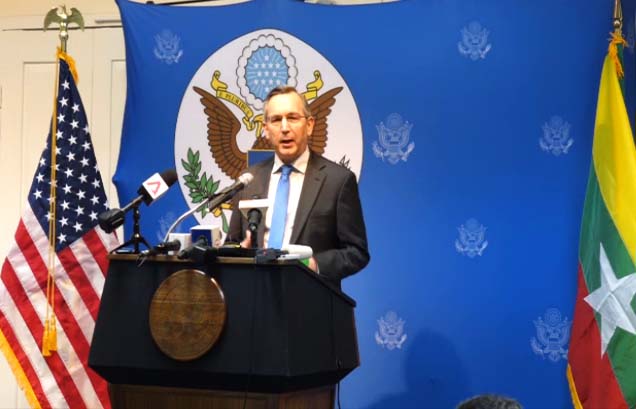Last week the Obama administration extended economic sanctions against Burma for another year saying the step is necessary despite the progress on democratic reforms.
President Barack Obama notified leaders of the Congress that, “The political opening remains nascent, and concerns persist regarding ongoing conflict and human rights abuses in ethnic minority areas, particularly in Rakhine [Arakan] State, and the continued role of the military in the country’s political and economic activities.”
The extension of sanctions, which comes with the renewal of the National Emergencies Act, prohibits American businesses and individuals from investing in Burma or doing business with Burmese figures involved in the repression of the pro-democracy movement since the mid-1990s.
The Obama administration’s policy is an indication of the importance of ethnic minority issues in US-Burma diplomatic relations. It also reflects the sentiment of the international community.
The general expectation before the extension of sanctions was that the US would move toward normalising bilateral relations as a civilian government has assumed power in Burma after more than five decades of direct or indirect military rule.
During the years of political and economic sanctions, the American leaders, irrespective of party affiliation, had largely been sympathetic and supportive of Aung San Suu Kyi. Her views were usually taken into account during the review process of American foreign policy toward Burma.
Given the important role of Suu Kyi as the de facto leader of the National League for Democracy (NLD) government, many within Burma and across the world had hoped that the American government would lift the remaining sanctions.
A year ago, the Obama administration lifted a ban on granting US entry visas to Burma’s military rulers and their business partners and immediate family. Bilateral relations have gradually improved in recent years, especially since 2011.
The extension of sanctions came days after the NLD government asked US Ambassador Scot Marciel not to use “Rohingya” on the grounds that using the term is not supportive in solving the prevailing tension in Arakan State and could even worsen the situation.
Last month, Buddhist monks joined several hundred protesters outside the US embassy in Rangoon in the wake of the embassy using the term “Rohingya” in a statement of concern after dozens died when a boat they were on capsized.
Despite the fact that some Rohingya have lived in the country for generations, the protesters demanded that they be referred to as Bengalis, implying that they are illegal immigrants from neighbouring Bangladesh.
Since Burma does not officially recognise the Rohingya as an ethnic group, it denies most of them citizenship and basic rights. Conflict over land and resources in Arakan State, where most Rohingya now live in squalid camps, caused deadly violence between Buddhists and Muslims in 2012, which later spread to other parts of the country.
The US government’s official position, in line with normal international practice, is that communities anywhere have the right or the ability to decide what they should be called.
Another major concern for the US government is the continued armed clashes between the Burmese army and ethnic armed groups, such as the Kachin Independence Army and the Arakan Army, groups that did not sign the Nationwide Ceasefire Agreement last October.
On 27 April, State Counsellor Aung San Suu Kyi held a meeting with the Joint Monitoring Committee, a body representative of the army and eight non-state armed groups that signed the NCA and proposed to convene a “Panglong-style” conference within two months.
There is lingering concern as to how the decades-old problem with the country’s ethnic minorities will be resolved, as the peace process remains precarious.
The historical bilateral relations between the United States and Burma suggests that the pace toward full normalisation of diplomatic ties between the two countries will largely depend on the situation in Burma’s domestic politics.
The protracted problems in the country, including the question of autonomy for ethnic minorities and the sensitive identity issue of Rohingya or Bengalis, will continue to be part of the United States government’s foreign policy review.
[related]
For Burma’s government and its people, it is high time that these lingering issues be addressed for the sake of the country’s peace, stability and development.
Finding a solution internally to the conundrum of the Rohingya should be emphasised. However, since many hold the view that they are illegal immigrants from Bangladesh, Burma should consider involving the Bangladeshi government and or a third party such as the Association of Southeast Asian Nations and the United Nations to address the issue.
This commentary originally appeared in The Bangkok Post. The views and opinions expressed in this article are the author’s and do not necessarily reflect DVB editorial policy.



